ACC80012 Taxation: Discretionary Trusts, Tax Avoidance and Benefits
VerifiedAdded on 2023/06/13
|13
|3449
|484
Essay
AI Summary
This essay provides an analysis of discretionary trusts in Australia, focusing on their uses, benefits, and potential for tax avoidance. It begins by defining discretionary trusts and outlining their non-tax advantages, such as asset protection, estate planning, and probate avoidance. The paper then discusses how discretionary trusts are exploited for tax avoidance through income splitting, providing examples of how high-income earners can minimize their tax liabilities. It critically analyzes whether the potential for tax avoidance outweighs the overall benefits of using discretionary trusts, highlighting the significant revenue losses for the government and the undermining of the integrity of the income tax system. The essay concludes with recommendations for addressing the issues related to discretionary trusts and taxation.
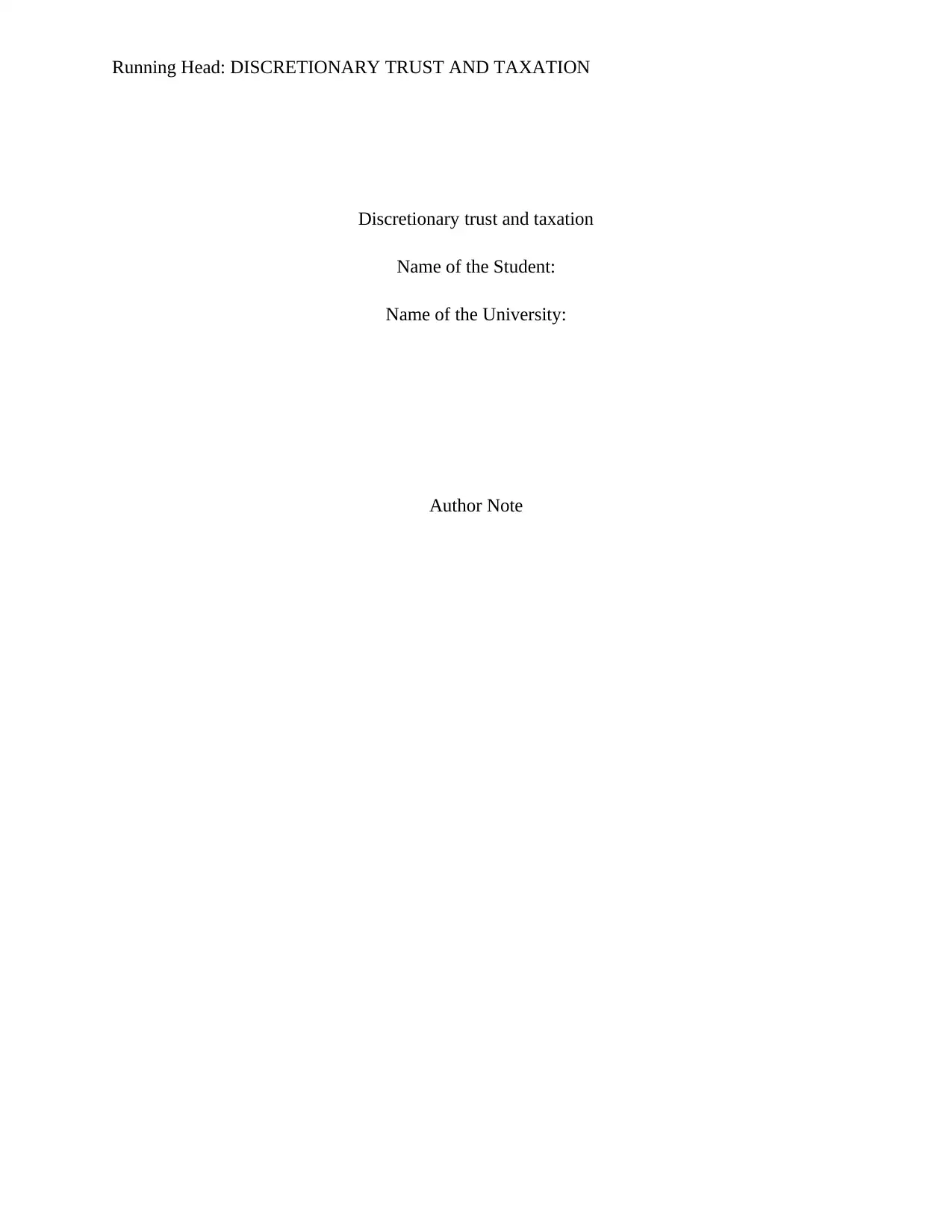
Running Head: DISCRETIONARY TRUST AND TAXATION
Discretionary trust and taxation
Name of the Student:
Name of the University:
Author Note
Discretionary trust and taxation
Name of the Student:
Name of the University:
Author Note
Paraphrase This Document
Need a fresh take? Get an instant paraphrase of this document with our AI Paraphraser
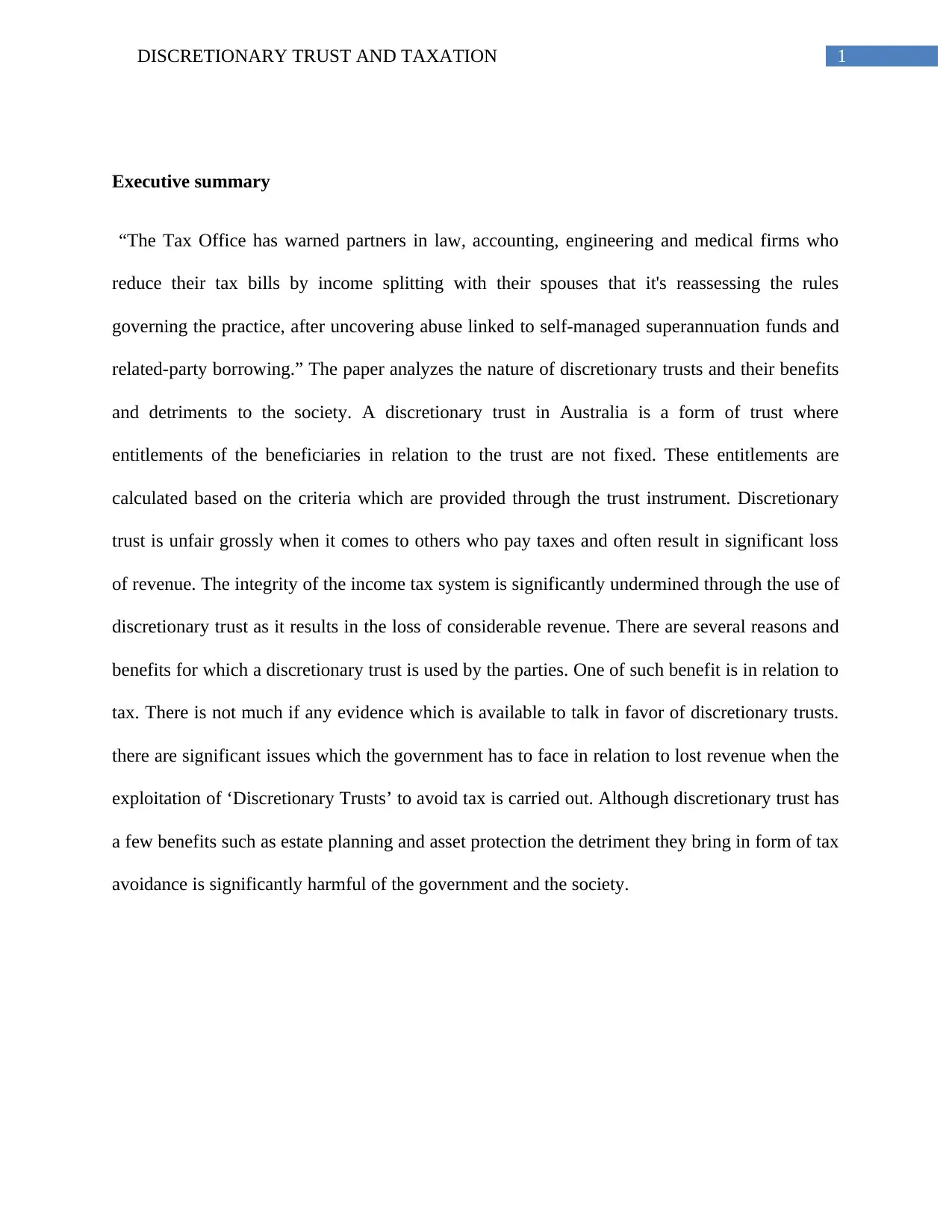
1DISCRETIONARY TRUST AND TAXATION
Executive summary
“The Tax Office has warned partners in law, accounting, engineering and medical firms who
reduce their tax bills by income splitting with their spouses that it's reassessing the rules
governing the practice, after uncovering abuse linked to self-managed superannuation funds and
related-party borrowing.” The paper analyzes the nature of discretionary trusts and their benefits
and detriments to the society. A discretionary trust in Australia is a form of trust where
entitlements of the beneficiaries in relation to the trust are not fixed. These entitlements are
calculated based on the criteria which are provided through the trust instrument. Discretionary
trust is unfair grossly when it comes to others who pay taxes and often result in significant loss
of revenue. The integrity of the income tax system is significantly undermined through the use of
discretionary trust as it results in the loss of considerable revenue. There are several reasons and
benefits for which a discretionary trust is used by the parties. One of such benefit is in relation to
tax. There is not much if any evidence which is available to talk in favor of discretionary trusts.
there are significant issues which the government has to face in relation to lost revenue when the
exploitation of ‘Discretionary Trusts’ to avoid tax is carried out. Although discretionary trust has
a few benefits such as estate planning and asset protection the detriment they bring in form of tax
avoidance is significantly harmful of the government and the society.
Executive summary
“The Tax Office has warned partners in law, accounting, engineering and medical firms who
reduce their tax bills by income splitting with their spouses that it's reassessing the rules
governing the practice, after uncovering abuse linked to self-managed superannuation funds and
related-party borrowing.” The paper analyzes the nature of discretionary trusts and their benefits
and detriments to the society. A discretionary trust in Australia is a form of trust where
entitlements of the beneficiaries in relation to the trust are not fixed. These entitlements are
calculated based on the criteria which are provided through the trust instrument. Discretionary
trust is unfair grossly when it comes to others who pay taxes and often result in significant loss
of revenue. The integrity of the income tax system is significantly undermined through the use of
discretionary trust as it results in the loss of considerable revenue. There are several reasons and
benefits for which a discretionary trust is used by the parties. One of such benefit is in relation to
tax. There is not much if any evidence which is available to talk in favor of discretionary trusts.
there are significant issues which the government has to face in relation to lost revenue when the
exploitation of ‘Discretionary Trusts’ to avoid tax is carried out. Although discretionary trust has
a few benefits such as estate planning and asset protection the detriment they bring in form of tax
avoidance is significantly harmful of the government and the society.
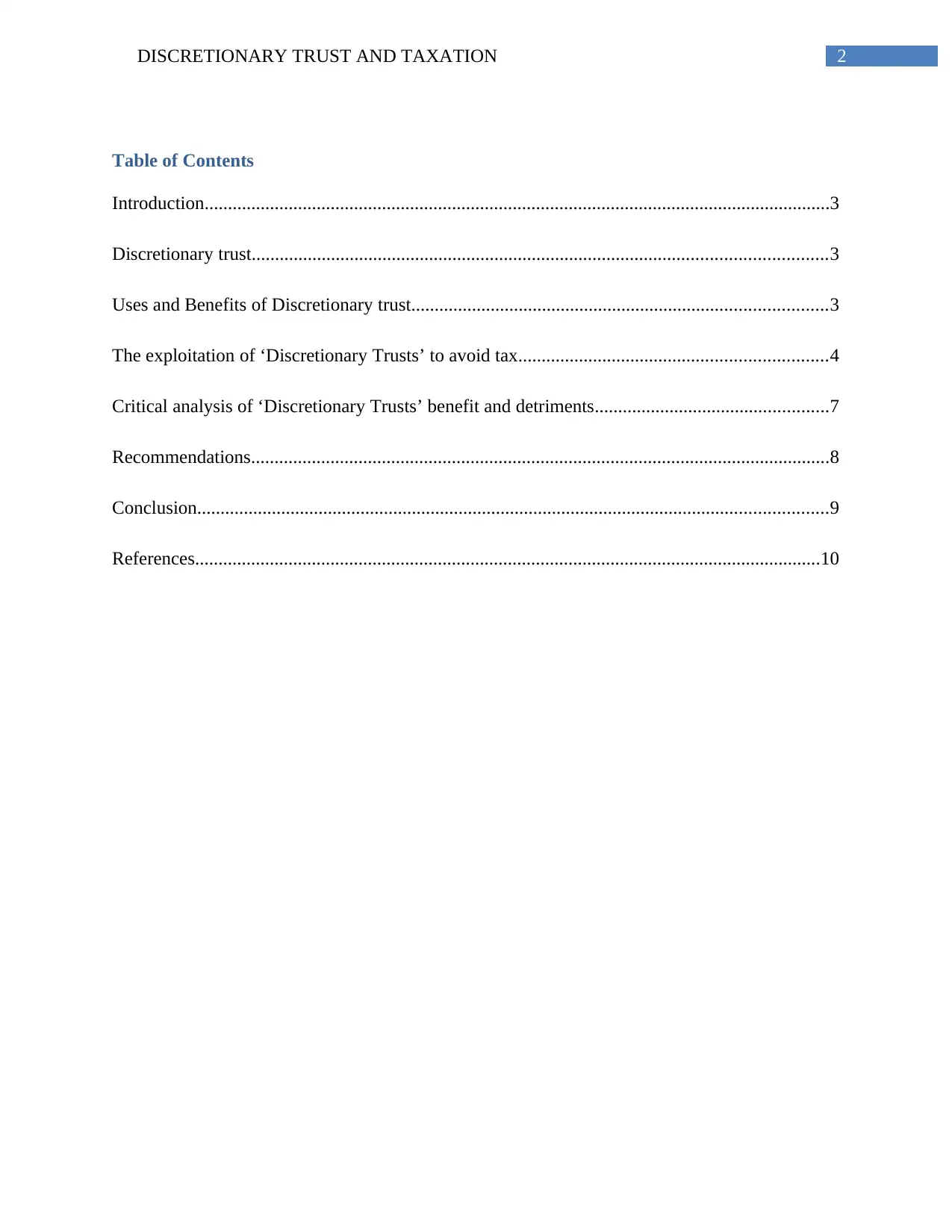
2DISCRETIONARY TRUST AND TAXATION
Table of Contents
Introduction......................................................................................................................................3
Discretionary trust...........................................................................................................................3
Uses and Benefits of Discretionary trust.........................................................................................3
The exploitation of ‘Discretionary Trusts’ to avoid tax..................................................................4
Critical analysis of ‘Discretionary Trusts’ benefit and detriments..................................................7
Recommendations............................................................................................................................8
Conclusion.......................................................................................................................................9
References......................................................................................................................................10
Table of Contents
Introduction......................................................................................................................................3
Discretionary trust...........................................................................................................................3
Uses and Benefits of Discretionary trust.........................................................................................3
The exploitation of ‘Discretionary Trusts’ to avoid tax..................................................................4
Critical analysis of ‘Discretionary Trusts’ benefit and detriments..................................................7
Recommendations............................................................................................................................8
Conclusion.......................................................................................................................................9
References......................................................................................................................................10
⊘ This is a preview!⊘
Do you want full access?
Subscribe today to unlock all pages.

Trusted by 1+ million students worldwide
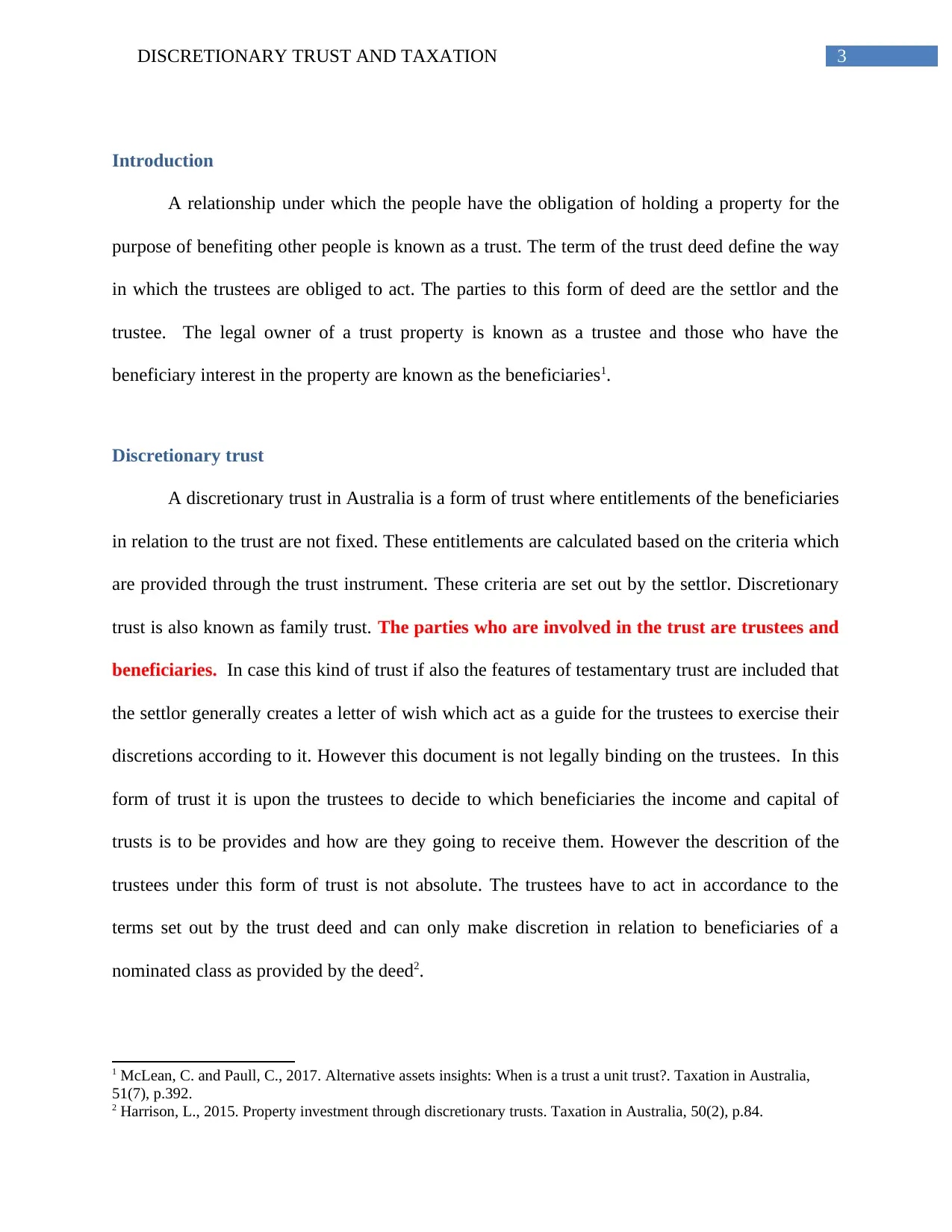
3DISCRETIONARY TRUST AND TAXATION
Introduction
A relationship under which the people have the obligation of holding a property for the
purpose of benefiting other people is known as a trust. The term of the trust deed define the way
in which the trustees are obliged to act. The parties to this form of deed are the settlor and the
trustee. The legal owner of a trust property is known as a trustee and those who have the
beneficiary interest in the property are known as the beneficiaries1.
Discretionary trust
A discretionary trust in Australia is a form of trust where entitlements of the beneficiaries
in relation to the trust are not fixed. These entitlements are calculated based on the criteria which
are provided through the trust instrument. These criteria are set out by the settlor. Discretionary
trust is also known as family trust. The parties who are involved in the trust are trustees and
beneficiaries. In case this kind of trust if also the features of testamentary trust are included that
the settlor generally creates a letter of wish which act as a guide for the trustees to exercise their
discretions according to it. However this document is not legally binding on the trustees. In this
form of trust it is upon the trustees to decide to which beneficiaries the income and capital of
trusts is to be provides and how are they going to receive them. However the descrition of the
trustees under this form of trust is not absolute. The trustees have to act in accordance to the
terms set out by the trust deed and can only make discretion in relation to beneficiaries of a
nominated class as provided by the deed2.
1 McLean, C. and Paull, C., 2017. Alternative assets insights: When is a trust a unit trust?. Taxation in Australia,
51(7), p.392.
2 Harrison, L., 2015. Property investment through discretionary trusts. Taxation in Australia, 50(2), p.84.
Introduction
A relationship under which the people have the obligation of holding a property for the
purpose of benefiting other people is known as a trust. The term of the trust deed define the way
in which the trustees are obliged to act. The parties to this form of deed are the settlor and the
trustee. The legal owner of a trust property is known as a trustee and those who have the
beneficiary interest in the property are known as the beneficiaries1.
Discretionary trust
A discretionary trust in Australia is a form of trust where entitlements of the beneficiaries
in relation to the trust are not fixed. These entitlements are calculated based on the criteria which
are provided through the trust instrument. These criteria are set out by the settlor. Discretionary
trust is also known as family trust. The parties who are involved in the trust are trustees and
beneficiaries. In case this kind of trust if also the features of testamentary trust are included that
the settlor generally creates a letter of wish which act as a guide for the trustees to exercise their
discretions according to it. However this document is not legally binding on the trustees. In this
form of trust it is upon the trustees to decide to which beneficiaries the income and capital of
trusts is to be provides and how are they going to receive them. However the descrition of the
trustees under this form of trust is not absolute. The trustees have to act in accordance to the
terms set out by the trust deed and can only make discretion in relation to beneficiaries of a
nominated class as provided by the deed2.
1 McLean, C. and Paull, C., 2017. Alternative assets insights: When is a trust a unit trust?. Taxation in Australia,
51(7), p.392.
2 Harrison, L., 2015. Property investment through discretionary trusts. Taxation in Australia, 50(2), p.84.
Paraphrase This Document
Need a fresh take? Get an instant paraphrase of this document with our AI Paraphraser
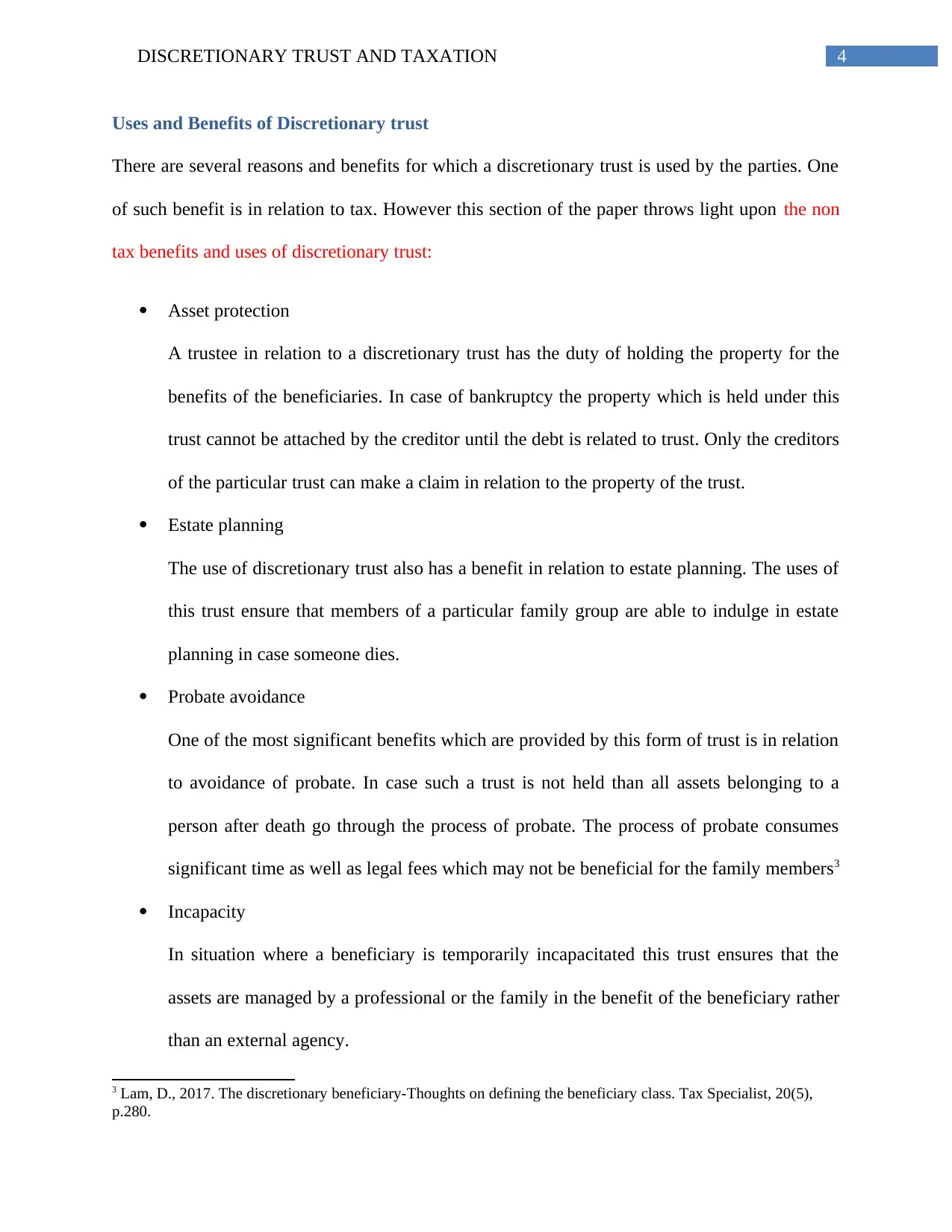
4DISCRETIONARY TRUST AND TAXATION
Uses and Benefits of Discretionary trust
There are several reasons and benefits for which a discretionary trust is used by the parties. One
of such benefit is in relation to tax. However this section of the paper throws light upon the non
tax benefits and uses of discretionary trust:
Asset protection
A trustee in relation to a discretionary trust has the duty of holding the property for the
benefits of the beneficiaries. In case of bankruptcy the property which is held under this
trust cannot be attached by the creditor until the debt is related to trust. Only the creditors
of the particular trust can make a claim in relation to the property of the trust.
Estate planning
The use of discretionary trust also has a benefit in relation to estate planning. The uses of
this trust ensure that members of a particular family group are able to indulge in estate
planning in case someone dies.
Probate avoidance
One of the most significant benefits which are provided by this form of trust is in relation
to avoidance of probate. In case such a trust is not held than all assets belonging to a
person after death go through the process of probate. The process of probate consumes
significant time as well as legal fees which may not be beneficial for the family members3
Incapacity
In situation where a beneficiary is temporarily incapacitated this trust ensures that the
assets are managed by a professional or the family in the benefit of the beneficiary rather
than an external agency.
3 Lam, D., 2017. The discretionary beneficiary-Thoughts on defining the beneficiary class. Tax Specialist, 20(5),
p.280.
Uses and Benefits of Discretionary trust
There are several reasons and benefits for which a discretionary trust is used by the parties. One
of such benefit is in relation to tax. However this section of the paper throws light upon the non
tax benefits and uses of discretionary trust:
Asset protection
A trustee in relation to a discretionary trust has the duty of holding the property for the
benefits of the beneficiaries. In case of bankruptcy the property which is held under this
trust cannot be attached by the creditor until the debt is related to trust. Only the creditors
of the particular trust can make a claim in relation to the property of the trust.
Estate planning
The use of discretionary trust also has a benefit in relation to estate planning. The uses of
this trust ensure that members of a particular family group are able to indulge in estate
planning in case someone dies.
Probate avoidance
One of the most significant benefits which are provided by this form of trust is in relation
to avoidance of probate. In case such a trust is not held than all assets belonging to a
person after death go through the process of probate. The process of probate consumes
significant time as well as legal fees which may not be beneficial for the family members3
Incapacity
In situation where a beneficiary is temporarily incapacitated this trust ensures that the
assets are managed by a professional or the family in the benefit of the beneficiary rather
than an external agency.
3 Lam, D., 2017. The discretionary beneficiary-Thoughts on defining the beneficiary class. Tax Specialist, 20(5),
p.280.
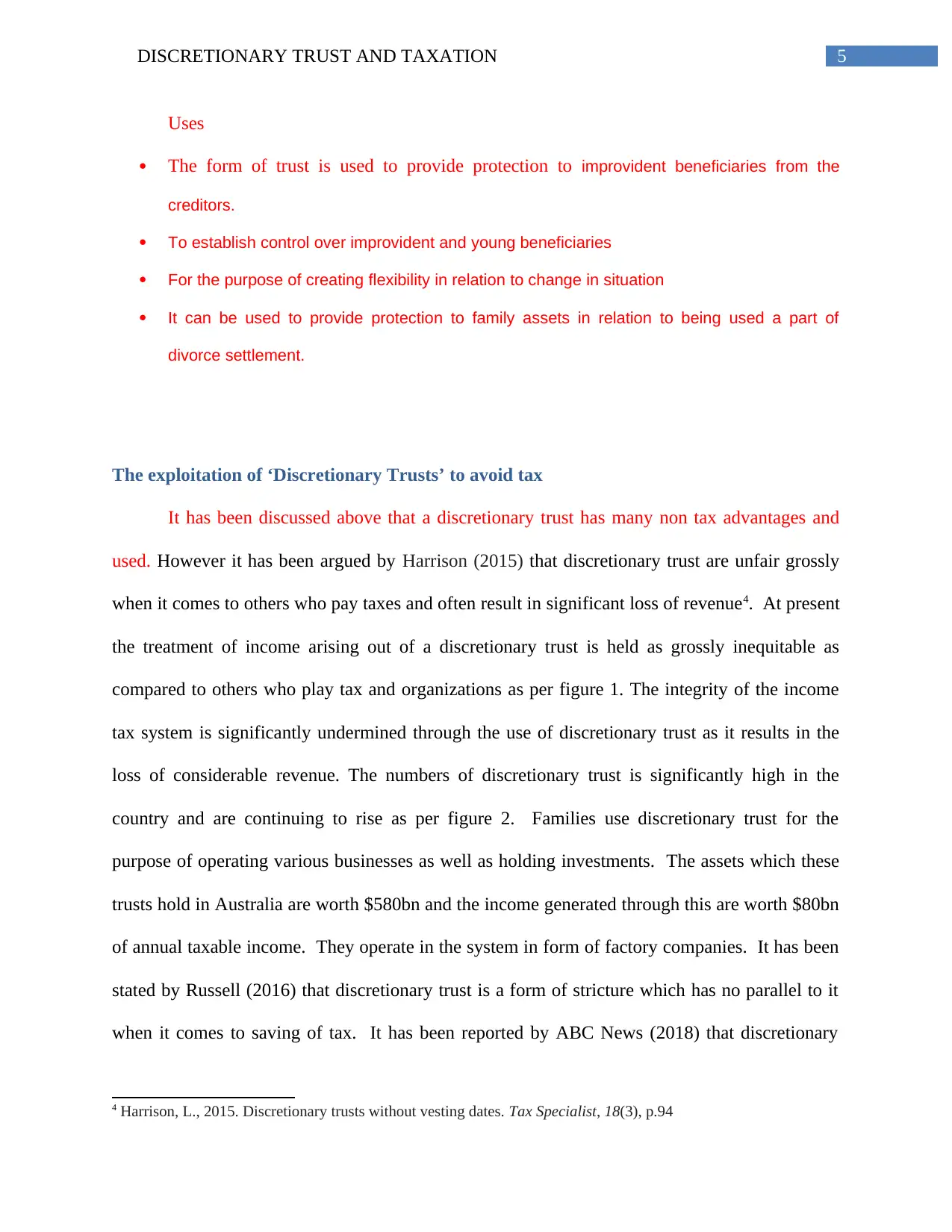
5DISCRETIONARY TRUST AND TAXATION
Uses
The form of trust is used to provide protection to improvident beneficiaries from the
creditors.
To establish control over improvident and young beneficiaries
For the purpose of creating flexibility in relation to change in situation
It can be used to provide protection to family assets in relation to being used a part of
divorce settlement.
The exploitation of ‘Discretionary Trusts’ to avoid tax
It has been discussed above that a discretionary trust has many non tax advantages and
used. However it has been argued by Harrison (2015) that discretionary trust are unfair grossly
when it comes to others who pay taxes and often result in significant loss of revenue4. At present
the treatment of income arising out of a discretionary trust is held as grossly inequitable as
compared to others who play tax and organizations as per figure 1. The integrity of the income
tax system is significantly undermined through the use of discretionary trust as it results in the
loss of considerable revenue. The numbers of discretionary trust is significantly high in the
country and are continuing to rise as per figure 2. Families use discretionary trust for the
purpose of operating various businesses as well as holding investments. The assets which these
trusts hold in Australia are worth $580bn and the income generated through this are worth $80bn
of annual taxable income. They operate in the system in form of factory companies. It has been
stated by Russell (2016) that discretionary trust is a form of stricture which has no parallel to it
when it comes to saving of tax. It has been reported by ABC News (2018) that discretionary
4 Harrison, L., 2015. Discretionary trusts without vesting dates. Tax Specialist, 18(3), p.94
Uses
The form of trust is used to provide protection to improvident beneficiaries from the
creditors.
To establish control over improvident and young beneficiaries
For the purpose of creating flexibility in relation to change in situation
It can be used to provide protection to family assets in relation to being used a part of
divorce settlement.
The exploitation of ‘Discretionary Trusts’ to avoid tax
It has been discussed above that a discretionary trust has many non tax advantages and
used. However it has been argued by Harrison (2015) that discretionary trust are unfair grossly
when it comes to others who pay taxes and often result in significant loss of revenue4. At present
the treatment of income arising out of a discretionary trust is held as grossly inequitable as
compared to others who play tax and organizations as per figure 1. The integrity of the income
tax system is significantly undermined through the use of discretionary trust as it results in the
loss of considerable revenue. The numbers of discretionary trust is significantly high in the
country and are continuing to rise as per figure 2. Families use discretionary trust for the
purpose of operating various businesses as well as holding investments. The assets which these
trusts hold in Australia are worth $580bn and the income generated through this are worth $80bn
of annual taxable income. They operate in the system in form of factory companies. It has been
stated by Russell (2016) that discretionary trust is a form of stricture which has no parallel to it
when it comes to saving of tax. It has been reported by ABC News (2018) that discretionary
4 Harrison, L., 2015. Discretionary trusts without vesting dates. Tax Specialist, 18(3), p.94
⊘ This is a preview!⊘
Do you want full access?
Subscribe today to unlock all pages.

Trusted by 1+ million students worldwide
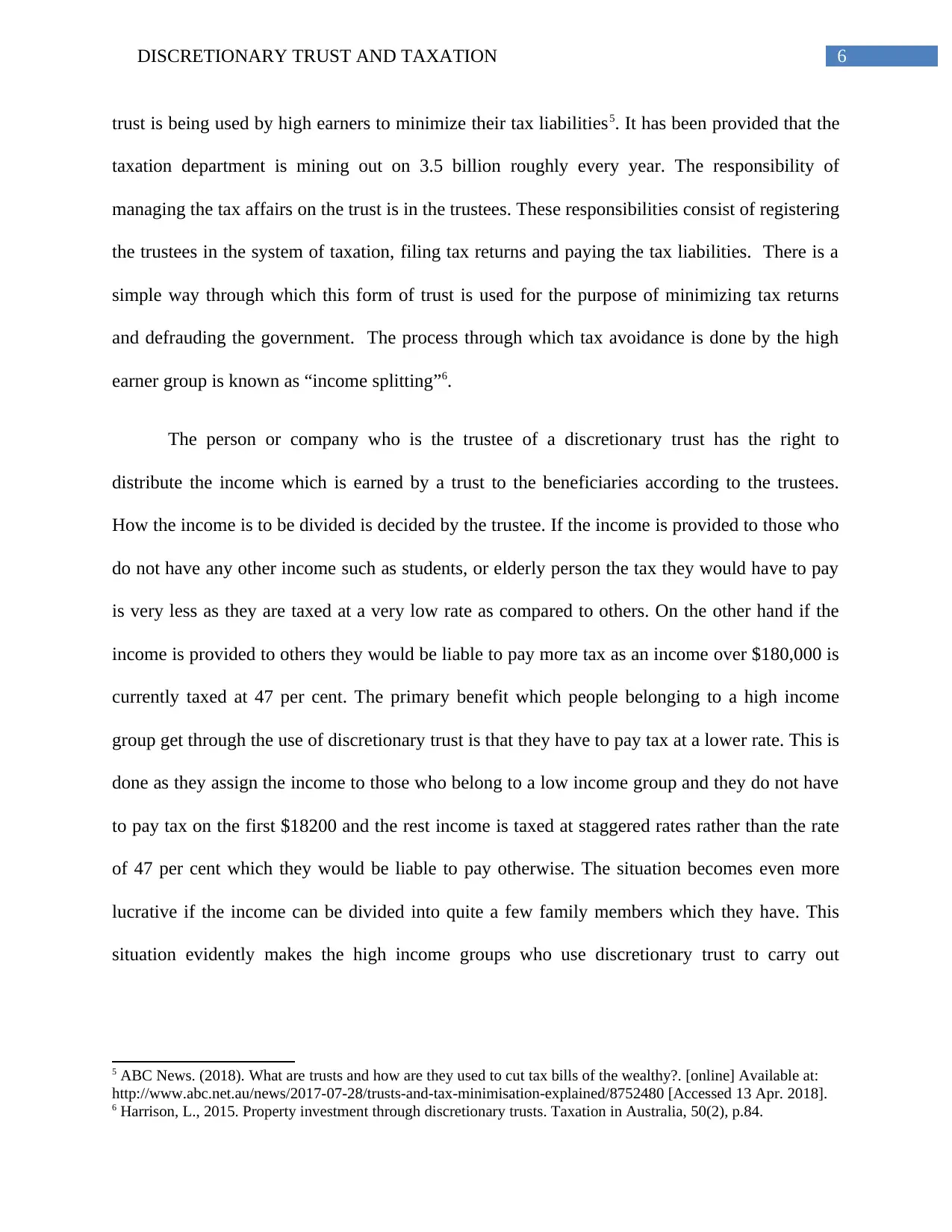
6DISCRETIONARY TRUST AND TAXATION
trust is being used by high earners to minimize their tax liabilities5. It has been provided that the
taxation department is mining out on 3.5 billion roughly every year. The responsibility of
managing the tax affairs on the trust is in the trustees. These responsibilities consist of registering
the trustees in the system of taxation, filing tax returns and paying the tax liabilities. There is a
simple way through which this form of trust is used for the purpose of minimizing tax returns
and defrauding the government. The process through which tax avoidance is done by the high
earner group is known as “income splitting”6.
The person or company who is the trustee of a discretionary trust has the right to
distribute the income which is earned by a trust to the beneficiaries according to the trustees.
How the income is to be divided is decided by the trustee. If the income is provided to those who
do not have any other income such as students, or elderly person the tax they would have to pay
is very less as they are taxed at a very low rate as compared to others. On the other hand if the
income is provided to others they would be liable to pay more tax as an income over $180,000 is
currently taxed at 47 per cent. The primary benefit which people belonging to a high income
group get through the use of discretionary trust is that they have to pay tax at a lower rate. This is
done as they assign the income to those who belong to a low income group and they do not have
to pay tax on the first $18200 and the rest income is taxed at staggered rates rather than the rate
of 47 per cent which they would be liable to pay otherwise. The situation becomes even more
lucrative if the income can be divided into quite a few family members which they have. This
situation evidently makes the high income groups who use discretionary trust to carry out
5 ABC News. (2018). What are trusts and how are they used to cut tax bills of the wealthy?. [online] Available at:
http://www.abc.net.au/news/2017-07-28/trusts-and-tax-minimisation-explained/8752480 [Accessed 13 Apr. 2018].
6 Harrison, L., 2015. Property investment through discretionary trusts. Taxation in Australia, 50(2), p.84.
trust is being used by high earners to minimize their tax liabilities5. It has been provided that the
taxation department is mining out on 3.5 billion roughly every year. The responsibility of
managing the tax affairs on the trust is in the trustees. These responsibilities consist of registering
the trustees in the system of taxation, filing tax returns and paying the tax liabilities. There is a
simple way through which this form of trust is used for the purpose of minimizing tax returns
and defrauding the government. The process through which tax avoidance is done by the high
earner group is known as “income splitting”6.
The person or company who is the trustee of a discretionary trust has the right to
distribute the income which is earned by a trust to the beneficiaries according to the trustees.
How the income is to be divided is decided by the trustee. If the income is provided to those who
do not have any other income such as students, or elderly person the tax they would have to pay
is very less as they are taxed at a very low rate as compared to others. On the other hand if the
income is provided to others they would be liable to pay more tax as an income over $180,000 is
currently taxed at 47 per cent. The primary benefit which people belonging to a high income
group get through the use of discretionary trust is that they have to pay tax at a lower rate. This is
done as they assign the income to those who belong to a low income group and they do not have
to pay tax on the first $18200 and the rest income is taxed at staggered rates rather than the rate
of 47 per cent which they would be liable to pay otherwise. The situation becomes even more
lucrative if the income can be divided into quite a few family members which they have. This
situation evidently makes the high income groups who use discretionary trust to carry out
5 ABC News. (2018). What are trusts and how are they used to cut tax bills of the wealthy?. [online] Available at:
http://www.abc.net.au/news/2017-07-28/trusts-and-tax-minimisation-explained/8752480 [Accessed 13 Apr. 2018].
6 Harrison, L., 2015. Property investment through discretionary trusts. Taxation in Australia, 50(2), p.84.
Paraphrase This Document
Need a fresh take? Get an instant paraphrase of this document with our AI Paraphraser
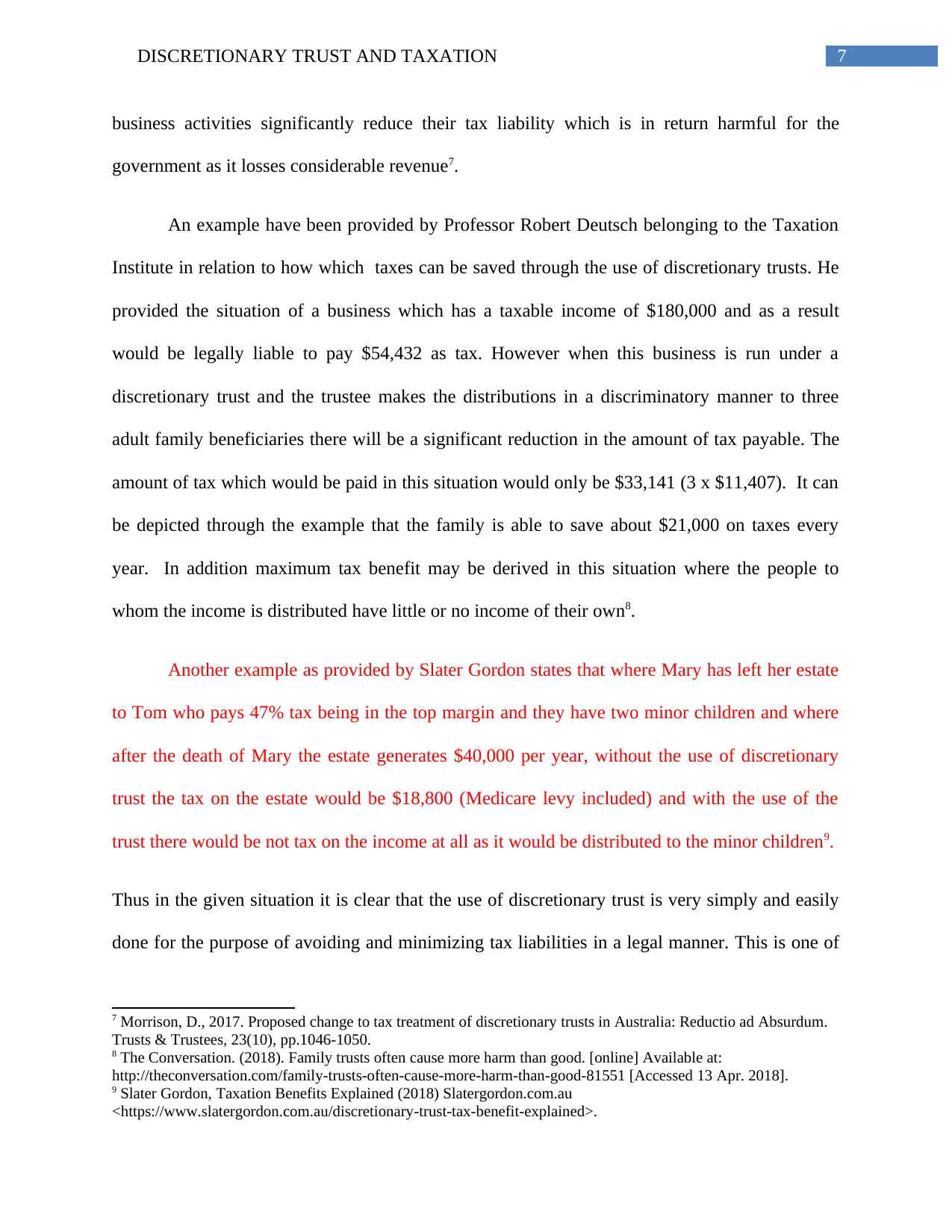
7DISCRETIONARY TRUST AND TAXATION
business activities significantly reduce their tax liability which is in return harmful for the
government as it losses considerable revenue7.
An example have been provided by Professor Robert Deutsch belonging to the Taxation
Institute in relation to how which taxes can be saved through the use of discretionary trusts. He
provided the situation of a business which has a taxable income of $180,000 and as a result
would be legally liable to pay $54,432 as tax. However when this business is run under a
discretionary trust and the trustee makes the distributions in a discriminatory manner to three
adult family beneficiaries there will be a significant reduction in the amount of tax payable. The
amount of tax which would be paid in this situation would only be $33,141 (3 x $11,407). It can
be depicted through the example that the family is able to save about $21,000 on taxes every
year. In addition maximum tax benefit may be derived in this situation where the people to
whom the income is distributed have little or no income of their own8.
Another example as provided by Slater Gordon states that where Mary has left her estate
to Tom who pays 47% tax being in the top margin and they have two minor children and where
after the death of Mary the estate generates $40,000 per year, without the use of discretionary
trust the tax on the estate would be $18,800 (Medicare levy included) and with the use of the
trust there would be not tax on the income at all as it would be distributed to the minor children9.
Thus in the given situation it is clear that the use of discretionary trust is very simply and easily
done for the purpose of avoiding and minimizing tax liabilities in a legal manner. This is one of
7 Morrison, D., 2017. Proposed change to tax treatment of discretionary trusts in Australia: Reductio ad Absurdum.
Trusts & Trustees, 23(10), pp.1046-1050.
8 The Conversation. (2018). Family trusts often cause more harm than good. [online] Available at:
http://theconversation.com/family-trusts-often-cause-more-harm-than-good-81551 [Accessed 13 Apr. 2018].
9 Slater Gordon, Taxation Benefits Explained (2018) Slatergordon.com.au
<https://www.slatergordon.com.au/discretionary-trust-tax-benefit-explained>.
business activities significantly reduce their tax liability which is in return harmful for the
government as it losses considerable revenue7.
An example have been provided by Professor Robert Deutsch belonging to the Taxation
Institute in relation to how which taxes can be saved through the use of discretionary trusts. He
provided the situation of a business which has a taxable income of $180,000 and as a result
would be legally liable to pay $54,432 as tax. However when this business is run under a
discretionary trust and the trustee makes the distributions in a discriminatory manner to three
adult family beneficiaries there will be a significant reduction in the amount of tax payable. The
amount of tax which would be paid in this situation would only be $33,141 (3 x $11,407). It can
be depicted through the example that the family is able to save about $21,000 on taxes every
year. In addition maximum tax benefit may be derived in this situation where the people to
whom the income is distributed have little or no income of their own8.
Another example as provided by Slater Gordon states that where Mary has left her estate
to Tom who pays 47% tax being in the top margin and they have two minor children and where
after the death of Mary the estate generates $40,000 per year, without the use of discretionary
trust the tax on the estate would be $18,800 (Medicare levy included) and with the use of the
trust there would be not tax on the income at all as it would be distributed to the minor children9.
Thus in the given situation it is clear that the use of discretionary trust is very simply and easily
done for the purpose of avoiding and minimizing tax liabilities in a legal manner. This is one of
7 Morrison, D., 2017. Proposed change to tax treatment of discretionary trusts in Australia: Reductio ad Absurdum.
Trusts & Trustees, 23(10), pp.1046-1050.
8 The Conversation. (2018). Family trusts often cause more harm than good. [online] Available at:
http://theconversation.com/family-trusts-often-cause-more-harm-than-good-81551 [Accessed 13 Apr. 2018].
9 Slater Gordon, Taxation Benefits Explained (2018) Slatergordon.com.au
<https://www.slatergordon.com.au/discretionary-trust-tax-benefit-explained>.
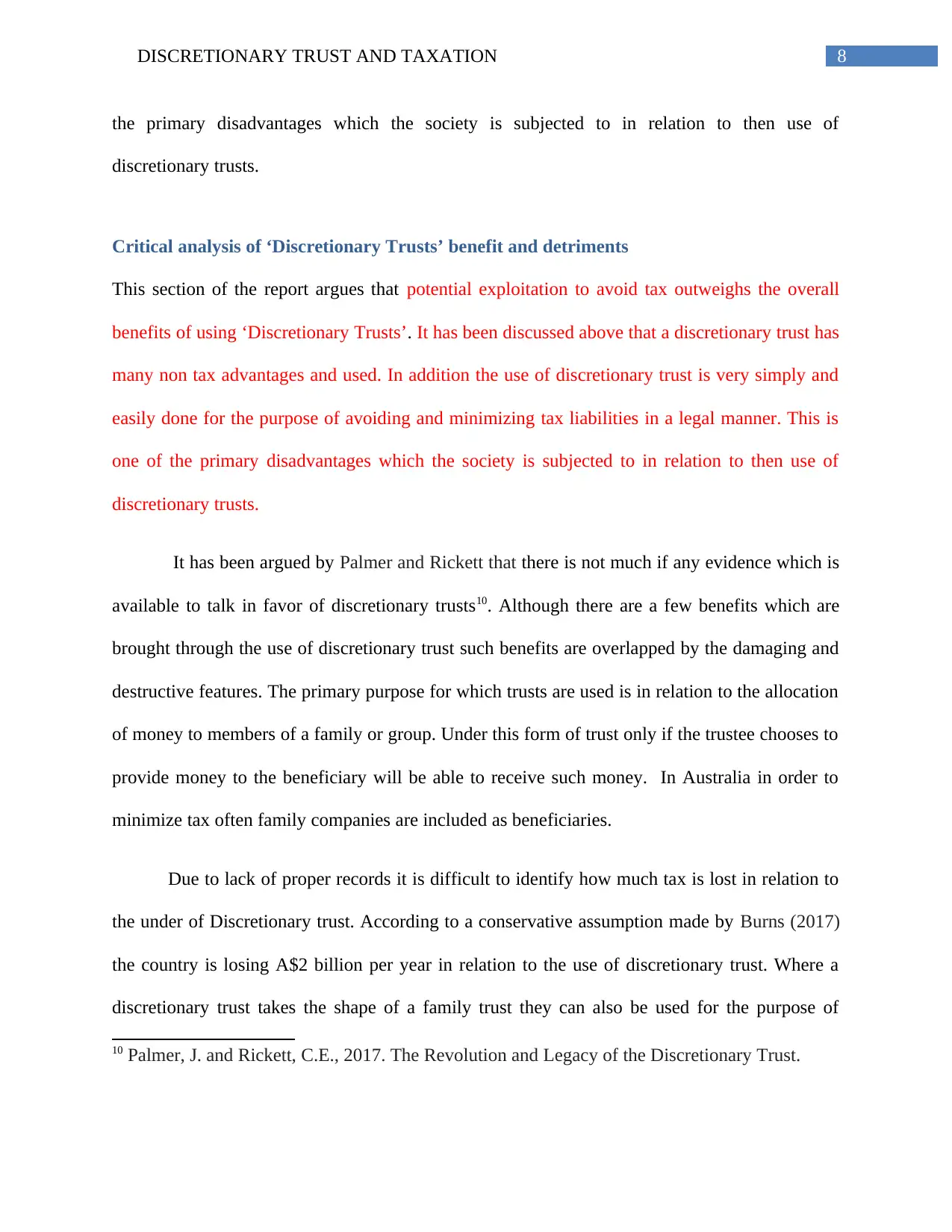
8DISCRETIONARY TRUST AND TAXATION
the primary disadvantages which the society is subjected to in relation to then use of
discretionary trusts.
Critical analysis of ‘Discretionary Trusts’ benefit and detriments
This section of the report argues that potential exploitation to avoid tax outweighs the overall
benefits of using ‘Discretionary Trusts’. It has been discussed above that a discretionary trust has
many non tax advantages and used. In addition the use of discretionary trust is very simply and
easily done for the purpose of avoiding and minimizing tax liabilities in a legal manner. This is
one of the primary disadvantages which the society is subjected to in relation to then use of
discretionary trusts.
It has been argued by Palmer and Rickett that there is not much if any evidence which is
available to talk in favor of discretionary trusts10. Although there are a few benefits which are
brought through the use of discretionary trust such benefits are overlapped by the damaging and
destructive features. The primary purpose for which trusts are used is in relation to the allocation
of money to members of a family or group. Under this form of trust only if the trustee chooses to
provide money to the beneficiary will be able to receive such money. In Australia in order to
minimize tax often family companies are included as beneficiaries.
Due to lack of proper records it is difficult to identify how much tax is lost in relation to
the under of Discretionary trust. According to a conservative assumption made by Burns (2017)
the country is losing A$2 billion per year in relation to the use of discretionary trust. Where a
discretionary trust takes the shape of a family trust they can also be used for the purpose of
10 Palmer, J. and Rickett, C.E., 2017. The Revolution and Legacy of the Discretionary Trust.
the primary disadvantages which the society is subjected to in relation to then use of
discretionary trusts.
Critical analysis of ‘Discretionary Trusts’ benefit and detriments
This section of the report argues that potential exploitation to avoid tax outweighs the overall
benefits of using ‘Discretionary Trusts’. It has been discussed above that a discretionary trust has
many non tax advantages and used. In addition the use of discretionary trust is very simply and
easily done for the purpose of avoiding and minimizing tax liabilities in a legal manner. This is
one of the primary disadvantages which the society is subjected to in relation to then use of
discretionary trusts.
It has been argued by Palmer and Rickett that there is not much if any evidence which is
available to talk in favor of discretionary trusts10. Although there are a few benefits which are
brought through the use of discretionary trust such benefits are overlapped by the damaging and
destructive features. The primary purpose for which trusts are used is in relation to the allocation
of money to members of a family or group. Under this form of trust only if the trustee chooses to
provide money to the beneficiary will be able to receive such money. In Australia in order to
minimize tax often family companies are included as beneficiaries.
Due to lack of proper records it is difficult to identify how much tax is lost in relation to
the under of Discretionary trust. According to a conservative assumption made by Burns (2017)
the country is losing A$2 billion per year in relation to the use of discretionary trust. Where a
discretionary trust takes the shape of a family trust they can also be used for the purpose of
10 Palmer, J. and Rickett, C.E., 2017. The Revolution and Legacy of the Discretionary Trust.
⊘ This is a preview!⊘
Do you want full access?
Subscribe today to unlock all pages.

Trusted by 1+ million students worldwide
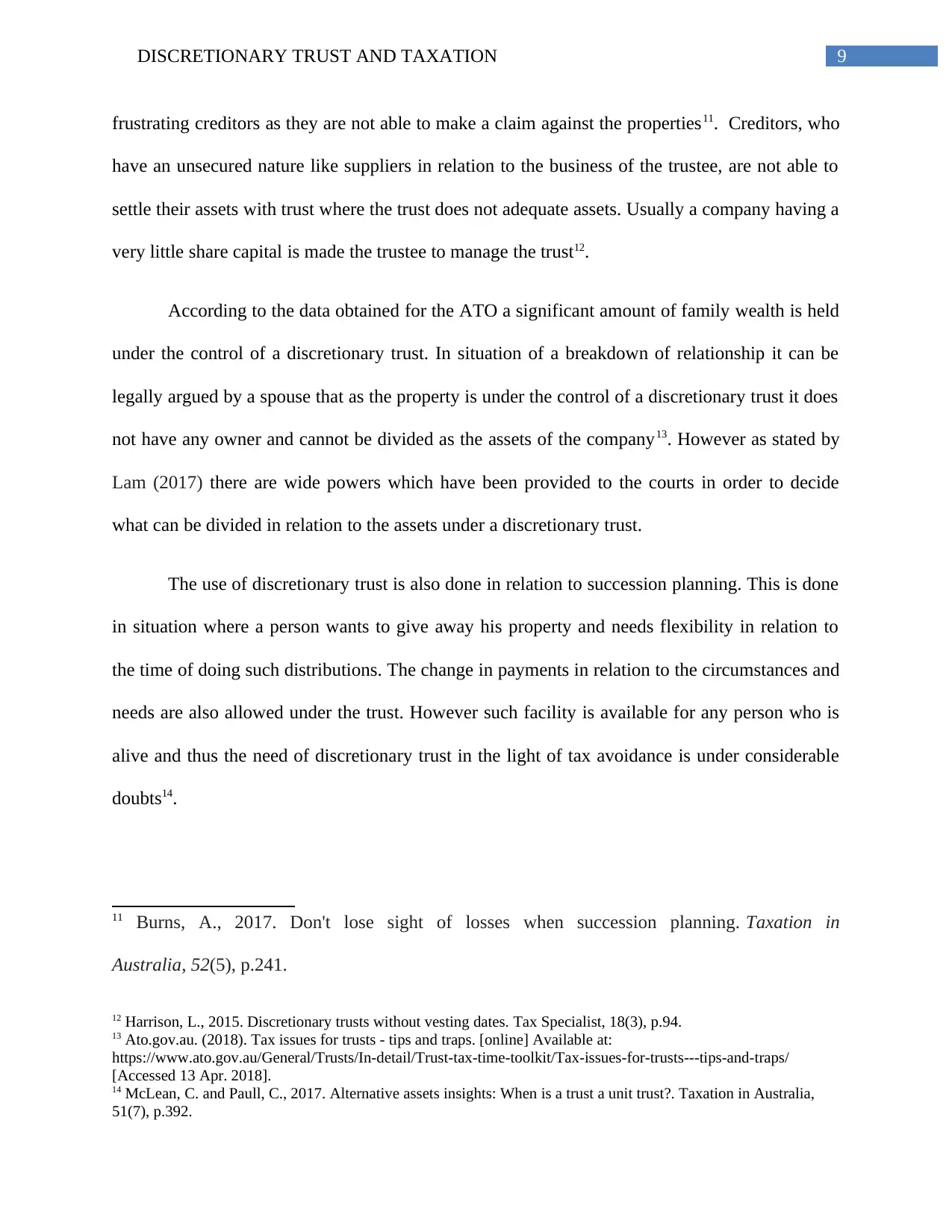
9DISCRETIONARY TRUST AND TAXATION
frustrating creditors as they are not able to make a claim against the properties11. Creditors, who
have an unsecured nature like suppliers in relation to the business of the trustee, are not able to
settle their assets with trust where the trust does not adequate assets. Usually a company having a
very little share capital is made the trustee to manage the trust12.
According to the data obtained for the ATO a significant amount of family wealth is held
under the control of a discretionary trust. In situation of a breakdown of relationship it can be
legally argued by a spouse that as the property is under the control of a discretionary trust it does
not have any owner and cannot be divided as the assets of the company13. However as stated by
Lam (2017) there are wide powers which have been provided to the courts in order to decide
what can be divided in relation to the assets under a discretionary trust.
The use of discretionary trust is also done in relation to succession planning. This is done
in situation where a person wants to give away his property and needs flexibility in relation to
the time of doing such distributions. The change in payments in relation to the circumstances and
needs are also allowed under the trust. However such facility is available for any person who is
alive and thus the need of discretionary trust in the light of tax avoidance is under considerable
doubts14.
11 Burns, A., 2017. Don't lose sight of losses when succession planning. Taxation in
Australia, 52(5), p.241.
12 Harrison, L., 2015. Discretionary trusts without vesting dates. Tax Specialist, 18(3), p.94.
13 Ato.gov.au. (2018). Tax issues for trusts - tips and traps. [online] Available at:
https://www.ato.gov.au/General/Trusts/In-detail/Trust-tax-time-toolkit/Tax-issues-for-trusts---tips-and-traps/
[Accessed 13 Apr. 2018].
14 McLean, C. and Paull, C., 2017. Alternative assets insights: When is a trust a unit trust?. Taxation in Australia,
51(7), p.392.
frustrating creditors as they are not able to make a claim against the properties11. Creditors, who
have an unsecured nature like suppliers in relation to the business of the trustee, are not able to
settle their assets with trust where the trust does not adequate assets. Usually a company having a
very little share capital is made the trustee to manage the trust12.
According to the data obtained for the ATO a significant amount of family wealth is held
under the control of a discretionary trust. In situation of a breakdown of relationship it can be
legally argued by a spouse that as the property is under the control of a discretionary trust it does
not have any owner and cannot be divided as the assets of the company13. However as stated by
Lam (2017) there are wide powers which have been provided to the courts in order to decide
what can be divided in relation to the assets under a discretionary trust.
The use of discretionary trust is also done in relation to succession planning. This is done
in situation where a person wants to give away his property and needs flexibility in relation to
the time of doing such distributions. The change in payments in relation to the circumstances and
needs are also allowed under the trust. However such facility is available for any person who is
alive and thus the need of discretionary trust in the light of tax avoidance is under considerable
doubts14.
11 Burns, A., 2017. Don't lose sight of losses when succession planning. Taxation in
Australia, 52(5), p.241.
12 Harrison, L., 2015. Discretionary trusts without vesting dates. Tax Specialist, 18(3), p.94.
13 Ato.gov.au. (2018). Tax issues for trusts - tips and traps. [online] Available at:
https://www.ato.gov.au/General/Trusts/In-detail/Trust-tax-time-toolkit/Tax-issues-for-trusts---tips-and-traps/
[Accessed 13 Apr. 2018].
14 McLean, C. and Paull, C., 2017. Alternative assets insights: When is a trust a unit trust?. Taxation in Australia,
51(7), p.392.
Paraphrase This Document
Need a fresh take? Get an instant paraphrase of this document with our AI Paraphraser
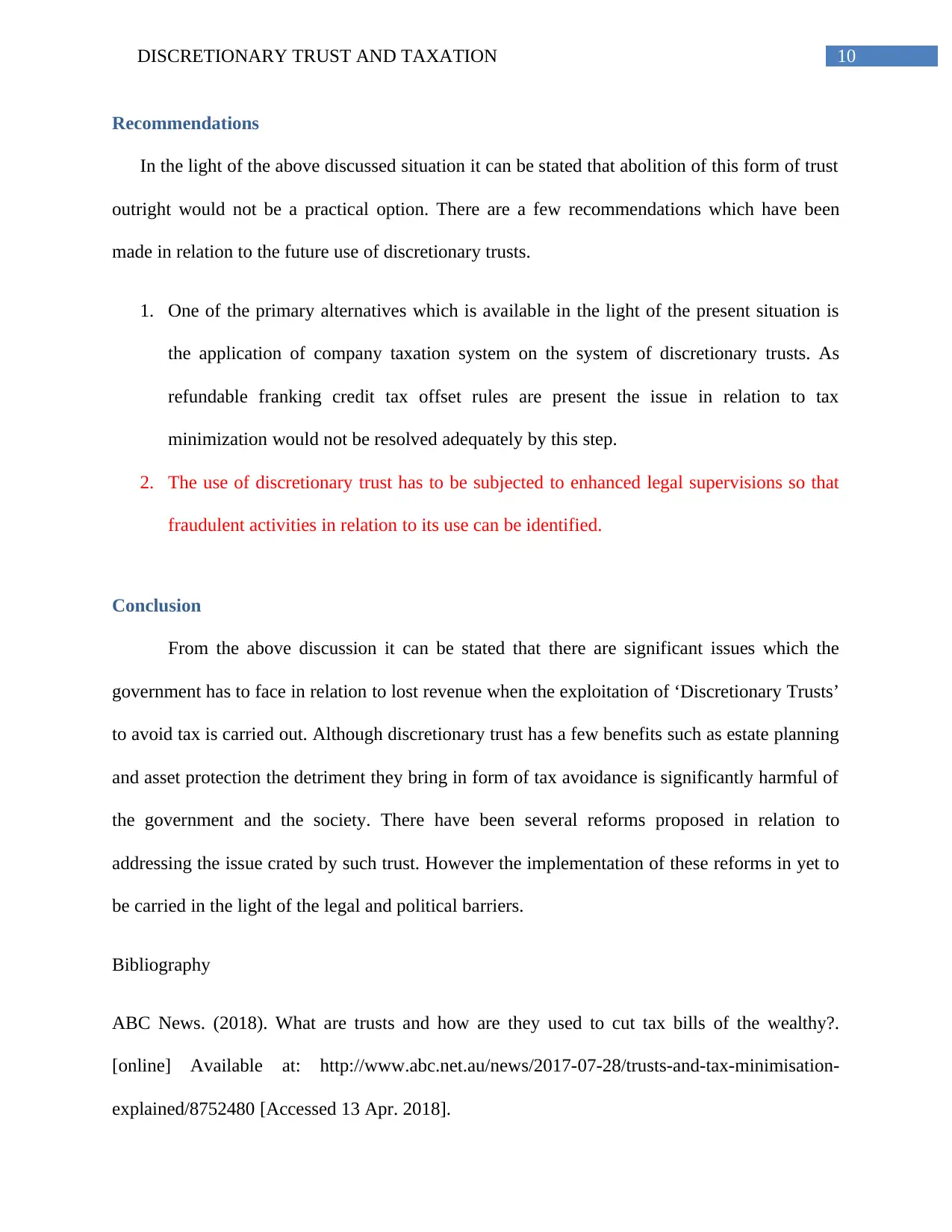
10DISCRETIONARY TRUST AND TAXATION
Recommendations
In the light of the above discussed situation it can be stated that abolition of this form of trust
outright would not be a practical option. There are a few recommendations which have been
made in relation to the future use of discretionary trusts.
1. One of the primary alternatives which is available in the light of the present situation is
the application of company taxation system on the system of discretionary trusts. As
refundable franking credit tax offset rules are present the issue in relation to tax
minimization would not be resolved adequately by this step.
2. The use of discretionary trust has to be subjected to enhanced legal supervisions so that
fraudulent activities in relation to its use can be identified.
Conclusion
From the above discussion it can be stated that there are significant issues which the
government has to face in relation to lost revenue when the exploitation of ‘Discretionary Trusts’
to avoid tax is carried out. Although discretionary trust has a few benefits such as estate planning
and asset protection the detriment they bring in form of tax avoidance is significantly harmful of
the government and the society. There have been several reforms proposed in relation to
addressing the issue crated by such trust. However the implementation of these reforms in yet to
be carried in the light of the legal and political barriers.
Bibliography
ABC News. (2018). What are trusts and how are they used to cut tax bills of the wealthy?.
[online] Available at: http://www.abc.net.au/news/2017-07-28/trusts-and-tax-minimisation-
explained/8752480 [Accessed 13 Apr. 2018].
Recommendations
In the light of the above discussed situation it can be stated that abolition of this form of trust
outright would not be a practical option. There are a few recommendations which have been
made in relation to the future use of discretionary trusts.
1. One of the primary alternatives which is available in the light of the present situation is
the application of company taxation system on the system of discretionary trusts. As
refundable franking credit tax offset rules are present the issue in relation to tax
minimization would not be resolved adequately by this step.
2. The use of discretionary trust has to be subjected to enhanced legal supervisions so that
fraudulent activities in relation to its use can be identified.
Conclusion
From the above discussion it can be stated that there are significant issues which the
government has to face in relation to lost revenue when the exploitation of ‘Discretionary Trusts’
to avoid tax is carried out. Although discretionary trust has a few benefits such as estate planning
and asset protection the detriment they bring in form of tax avoidance is significantly harmful of
the government and the society. There have been several reforms proposed in relation to
addressing the issue crated by such trust. However the implementation of these reforms in yet to
be carried in the light of the legal and political barriers.
Bibliography
ABC News. (2018). What are trusts and how are they used to cut tax bills of the wealthy?.
[online] Available at: http://www.abc.net.au/news/2017-07-28/trusts-and-tax-minimisation-
explained/8752480 [Accessed 13 Apr. 2018].
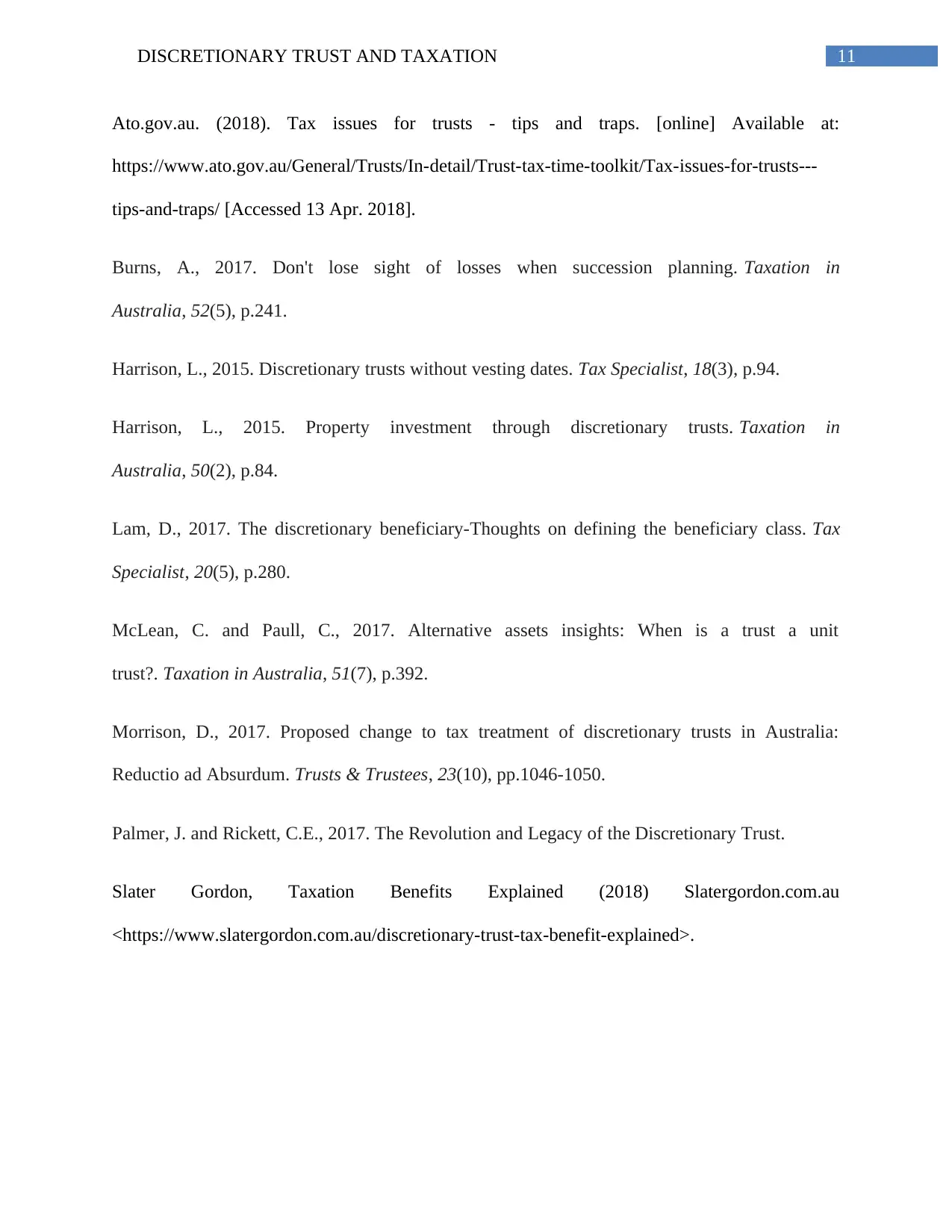
11DISCRETIONARY TRUST AND TAXATION
Ato.gov.au. (2018). Tax issues for trusts - tips and traps. [online] Available at:
https://www.ato.gov.au/General/Trusts/In-detail/Trust-tax-time-toolkit/Tax-issues-for-trusts---
tips-and-traps/ [Accessed 13 Apr. 2018].
Burns, A., 2017. Don't lose sight of losses when succession planning. Taxation in
Australia, 52(5), p.241.
Harrison, L., 2015. Discretionary trusts without vesting dates. Tax Specialist, 18(3), p.94.
Harrison, L., 2015. Property investment through discretionary trusts. Taxation in
Australia, 50(2), p.84.
Lam, D., 2017. The discretionary beneficiary-Thoughts on defining the beneficiary class. Tax
Specialist, 20(5), p.280.
McLean, C. and Paull, C., 2017. Alternative assets insights: When is a trust a unit
trust?. Taxation in Australia, 51(7), p.392.
Morrison, D., 2017. Proposed change to tax treatment of discretionary trusts in Australia:
Reductio ad Absurdum. Trusts & Trustees, 23(10), pp.1046-1050.
Palmer, J. and Rickett, C.E., 2017. The Revolution and Legacy of the Discretionary Trust.
Slater Gordon, Taxation Benefits Explained (2018) Slatergordon.com.au
<https://www.slatergordon.com.au/discretionary-trust-tax-benefit-explained>.
Ato.gov.au. (2018). Tax issues for trusts - tips and traps. [online] Available at:
https://www.ato.gov.au/General/Trusts/In-detail/Trust-tax-time-toolkit/Tax-issues-for-trusts---
tips-and-traps/ [Accessed 13 Apr. 2018].
Burns, A., 2017. Don't lose sight of losses when succession planning. Taxation in
Australia, 52(5), p.241.
Harrison, L., 2015. Discretionary trusts without vesting dates. Tax Specialist, 18(3), p.94.
Harrison, L., 2015. Property investment through discretionary trusts. Taxation in
Australia, 50(2), p.84.
Lam, D., 2017. The discretionary beneficiary-Thoughts on defining the beneficiary class. Tax
Specialist, 20(5), p.280.
McLean, C. and Paull, C., 2017. Alternative assets insights: When is a trust a unit
trust?. Taxation in Australia, 51(7), p.392.
Morrison, D., 2017. Proposed change to tax treatment of discretionary trusts in Australia:
Reductio ad Absurdum. Trusts & Trustees, 23(10), pp.1046-1050.
Palmer, J. and Rickett, C.E., 2017. The Revolution and Legacy of the Discretionary Trust.
Slater Gordon, Taxation Benefits Explained (2018) Slatergordon.com.au
<https://www.slatergordon.com.au/discretionary-trust-tax-benefit-explained>.
⊘ This is a preview!⊘
Do you want full access?
Subscribe today to unlock all pages.

Trusted by 1+ million students worldwide
1 out of 13
Related Documents
Your All-in-One AI-Powered Toolkit for Academic Success.
+13062052269
info@desklib.com
Available 24*7 on WhatsApp / Email
![[object Object]](/_next/static/media/star-bottom.7253800d.svg)
Unlock your academic potential
Copyright © 2020–2026 A2Z Services. All Rights Reserved. Developed and managed by ZUCOL.





